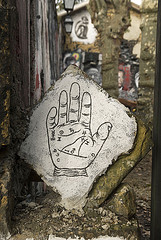Jul 24, 2011 3
Six Views of a Machine Gun
Inspired by Chuck Klostermann’s inspiring analysis of Led Zeppelin’s last performance at Knebworth. Thanks, Chuck.
1. Jimi Hendrix kicked off the last year of his life (1970) playing a series of shows at the Fillmore East with the Band of Gypsies. It is from one of these shows, recorded for posterity and released first as the album Band of Gypsies, that we have the definitive performance of his only overtly political song, “Machine Gun.” While the band played this song several times during their engagement, and Hendrix continued to play it until his death that September, this is the keeper:
2. When I was a kid, the off-handed political militancy of Jimi’s intro to this song was one thing that made it especially cool, even subversive and dangerous. Quoth Hendrix, “Happy New Year, first of all. I hope we have a million or two million more of them, if we can get over this summer [Foreshadowing!]. Ha, ha, ha. We’d like to dedicate this one to the draggin’ scene that’s going on: All the soldiers that are fighting in Chicago, Milwaukee, and New York. Oh, yes, and all the soldiers fighting in Vietnam. I’d like to do a thing called, ‘Machine Gun.'”
Now, Hendrix wasn’t particularly political and, if
Jun 27, 2011
Comments Off on The Web and Total Surveillance
I was trained as a Germanist, so I speak from experience when hastening to add that a prolonged fixation on the Germans and their culture poses similar hazards. That latter thought occurred to me as I considered the web not as a platform for free expression—even enabler of revolutions—but as a decentralized, massively intelligent surveillance device. A hybrid panopticon confessional. We tend to think of the web as an amalgam of information. What if we saw it instead as an accumulation of evidence? This is what happens when your communication system grows a universal memory. Anything that can exist as an electronic file can be connected to every other electronic file. And every communication across the network becomes/produces electronic files. Imagine a total catalog of an entire sphere of human communication, a sphere actually enclosing/encompassing it. And speaking of the evolution of the human psyche and the impact of environmental factors thereupon, with every experience we are building a sense of what can possibly happen. So, what is the proper pace for world-building? The internet exposes us to an insanely broad world of experiential possibility—indeed, it offers the greatest wealth of possibility individual human beings have ever encountered in the long lifetime of our species. These possibilities can, in their extremity, be shocking and disturbing to people, though not so much due to their graphic content, but rather because exposure to them accelerates, and in a painfully unidimensional manner, the intra-psychological process of world-building, producing, ultimately, a painful, homeostatic disruption. Never fear. We still have lives, the vast bulk of which will never leave a trace in this world wide web. Or, rather, only leave traces, nothing more. What is captured by the web is often only circumstantial evidence, after all, merely the trace. Our actual lived experience, phenomenologically speaking, never crosses the threshold except as description, depiction or expression. In other words, never as the thing itself. And, in this way, Kant’s uncrackable kernel (the echo of Leibniz’s) becomes our last, inscrutable refuge. Image Credit: dirtybronson.The Web and Total Surveillance
![]() Years ago I became obsessed with Ezra Pound, the fascist poet, and so I was reading a magazine article about his stay in St. Elizabeth’s Hospital and there was a fuzzy photo of Pound in there and the caption read something like, “Paranoia: An Occupational Hazard of Sinologists.”
Years ago I became obsessed with Ezra Pound, the fascist poet, and so I was reading a magazine article about his stay in St. Elizabeth’s Hospital and there was a fuzzy photo of Pound in there and the caption read something like, “Paranoia: An Occupational Hazard of Sinologists.”
Jun 20, 2011 Comments Off on On Message
On Message
 In my post about Odd Future, I said that music today—”mainstream” music, pop, country, “urban,” etc.—was devoid of message; it goes without saying that I was referring to a “political” message.
In my post about Odd Future, I said that music today—”mainstream” music, pop, country, “urban,” etc.—was devoid of message; it goes without saying that I was referring to a “political” message.
The messages of today’s music, on the contrary, from Rihanna and Katy Perry to the Kings of Leon, Coldplay and the Arctic Monkeys, are entirely “personal” (in the impersonal sense of anything produced for mass consumption, not “personal”in the sense of “uniquely idiosyncratic” or “obscurely private” — and especially not “personal” in the political sense).
This was not always so. Indeed, there was a time when the mainstream had its “political” hits: “99 Luftballons,” “London Calling,” and the incredibly incomparable, “We Are the World,” to name but a few. (If you haven’t seen the video for the latter song in a while, I urge you to check it out again. It has withstood the test of time and emerged, if possible, stranger. It’s particularly striking how the humanistic idealism of the song is drastically relativized by the fact that many of the people singing it are (or have become) millionaires, some in the “multi”-range. This fact makes the line, “We’re saving our own lives,” coming from certain lips, especially incongruous and even a little jarring.)
This complaint about popular music, however, does not mean that you can’t find tendentious and engaged music out there. It just means that, if you want music with a message, contemporary or vintage, you just have to look for it.
To take one example (albeit from 2001!), consider, “The Sickness,” recorded by the RZA (as “Bobby Digital”), with its impassioned (Nation of Gods and Earths) fundamentalist ethos (“Bless the seeds who praise the Most High without asking why”) and archaically militant refrain: “So praise the Lord/ and raise your sword/ against this wicked society/Society.” Read the rest of this entry »
Mar 2, 2011 9
Two and a Half Thoughts on Charlie Sheen
 I’ve recently become obsessed with Charlie Sheen.
I’ve recently become obsessed with Charlie Sheen.
This obsession—which is far from mine alone—must be understood against the backdrop of current events.
On the one hand, there is the spectacular political turmoil in the “Arab World,” whereby the successful regime change in Tunisia and Egypt has been followed by increasingly violent responses from the state in Algeria, Bahrain, Oman, and, of course, Libya.
On the other hand, here in the United States, we’re seeing exactly what Republican majorities and Republican executives are focused on: pressing their advantage to take on both the socio-economic programs of the Obama administration as well as organized labor (particularly in the form of public employee unions—the second to last bastion of unionism in the United States) and, apparently, women.
In other words, millions rising up against autocratic rulers in the face of mounting violence on the one hand, and “revolution from above” as the wealthy move to eviscerate the only real obstacles to their dominance here at home: unions and the democratic state apparatus.
So what does Charlie Sheen have to do with this and why, for example, would anyone compare him to Colonel Ghaddafi?
Mar 4, 2010 Comments Off on Publish and Perish
Publish and Perish
There are many reasons why my academic career didn’t pan out, but among them is undoubtedly the fact that I didn’t publish very much. For example, I never turned my dissertation on the Baader-Meinhof Gang into a book (though part of my research did end up in an obscure, Canadian journal called, Border/Lines).
When I did publish, it was essays like this one on the politics of gangsta rap.
Now, of course, I “publish” pretty much every day!
Life is so strange.
Dec 28, 2009 2
Check Out the Levels
 In Ithaca, my friend Art once told me that he hated it when people spoke of “levels” as in, “We’re seeing a whole other level of play on the court today.” (I had just told him that, having finished my dissertation, I felt that I had “moved to another level.”)
In Ithaca, my friend Art once told me that he hated it when people spoke of “levels” as in, “We’re seeing a whole other level of play on the court today.” (I had just told him that, having finished my dissertation, I felt that I had “moved to another level.”)
Years later, I’m in New Zealand hanging with this other friend, Russel, and I say, “I’ve always got to remind myself that there are other levels. Like, I imagine I’m at the highest level, but then I realize there’s another level.”
“There’s always another level,” Russel said.
I believe that there is always another level if for no other reason than that such a belief can spur us on and inspire us to be better, do more – grow, change, thrive.
Nevertheless, I also hold fast to the faith that there is a level where there are no levels at all.
Incredible Image Courtesy of kern.justin.
Sep 21, 2009 Comments Off on Formalism versus Fundamentalism
Formalism versus Fundamentalism
 As some of you may recall, and many of you will not, Frances Fukuyama published a book in 1992 entitled, The End of History and the Last Man. Fukuyama’s thesis therein was that, with the ascendancy of societies combining a free market economy with democratic political institutions, history, understood quasi-dialectically as a series of increasingly dominant and effective social forms, had, as the title suggests, ended.
As some of you may recall, and many of you will not, Frances Fukuyama published a book in 1992 entitled, The End of History and the Last Man. Fukuyama’s thesis therein was that, with the ascendancy of societies combining a free market economy with democratic political institutions, history, understood quasi-dialectically as a series of increasingly dominant and effective social forms, had, as the title suggests, ended.
Fukuyama’s thesis was and is plausible because, like the scientific rationality which forms the third angle of modernity’s powerful triumvirate, the free market and democracy share a distinct formalism. Just as “science” offers not a set of beliefs about the world so much as a method for exploring and solving its many mysteries, “democracy” merely offers a way of formulating laws and maintaining a system of government, without stipulating their specific content, while the “free market” provides general guidelines for the organization of commerce and trade, indifferent to the existence of a particular enterprise or commodity.
This formal abstraction lends to science, the free market, and democracy, a kind of universal timelessness and along with it an aura of finality. At the same time, this formal emptiness, while appealing to the reformer, appalls the revolutionary; the reformer sees in this open-endedness the possibility of continuous improvement; the revolutionary sees it as a failure to instantiate the absolute.